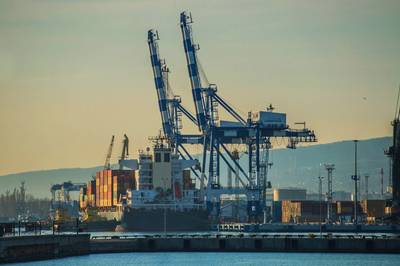Russia's Shipping Trade Slides After Ukraine Invasion
Russia's shipping trade has plummeted since Moscow's Feb. 24 invasion of Ukraine and Western sanctions push many foreign companies to suspend sailings, adding further pressure on the country's economy, according to freight data.
The world's biggest foreign container lines—including the top three MSC, Maersk, CMA CGM and others such as Hapag Lloyd—have temporarily suspended cargo shipments to and from Russia, while multiple companies including home furnishings firm IKEA have shut stores.
Food companies Nestle, Mondelez, Procter & Gamble PG.N and Unilever have halted investment in Russia, but said they would continue providing essentials.
Overall Russian import volumes for the week of March 2-8 have dropped 40% from the week of Feb 16–22 prior to the invasion, according to data from supply-chain tracking platform FourKites which analyzed all modes of transport including air and sea freight as well as by land using trucks.
The decrease has been across all industries with manufacturing, chemicals, as well as oil and gas import volumes down 33%, retail down 35%, and consumer packaged goods together with food and beverage down 57% over the same period, FourKites analysis showed.
"Shippers with cargo bound for Russia are asking, 'What can I do?' As major European carriers have stopped calling Russian ports, importers with cargo bound for St. Petersburg and Novorossiysk faced a barrage of issues," said Peter Sand, chief analyst at the air and ocean freight rate benchmarking platform Xeneta.
"As their cargoes are now spread out in different ports all in the wrong place with the main (European) ports shying completely away from handling Russia-bound containers."
The Russian government said on Thursday it had banned the export of 200 items including telecom, medical, auto, agricultural, electrical and tech equipment until the end of 2022, in retaliation for Western sanctions on Moscow.
The number of container ships within 50 nautical miles of Russian ports fell by nearly 30% by March 7 to around 177 vessels from over 250 on Feb. 24, analysis from logistics platform project44 showed.
According to other data from predictive maritime analytics company Windward, container vessels owned or operated by MSC, Maersk and CGA CGM made 1,244 port calls to Russian ports in the past year and represented 28% of all container vessel port calls to Russian ports over that period.
Container ships made 4,184 port calls to Russian ports in 2020, according to separate data from UNCTAD.
Rolf Habben Jansen, chief executive of Germany's Hapag Lloyd, said the container line was still trying to deliver some humanitarian goods including food.
"We have to comply with the sanctions in place and as long as long as they are there, I do not think that we will have the ability to return," Jansen told a virtual news conference on Thursday.
The situation is also challenging in other areas involving Russia's vital oil trade.
According to Windward analysis, 248 tankers were reporting their positions as headed to Russia as of March 7. Of those, 149 were Russian flagged and a further 13 owned or operated by Russian affiliated companies.
That left 86 tankers not affiliated with Russian companies, which compared with 125 foreign tankers heading to Russian ports a month ago and 98 Russian flagged tankers and an additional 38 were owned or operated by companies registered in Russia, the Windward analysis showed.
Insurance risks
Last week British ship insurer West of England said it withdrew cover for two container ships operated by Russia's FESCO Transportation Group after the vessels were listed by the U.S. Treasury as part of broader sanctions.
"In the cargo sector, we are seeing more and more shipping companies suspend cargo bookings to and from Russia," said Antonia Panayides, shipping partner with law firm Reed Smith.
"The sanction regulations are not static and must be carefully considered."
There are also broader risks emerging with Russian trade.
There is concern among some shipping lines still sailing into Russian ports such as St Petersburg and the circumstances under which the Russian authorities could arrest the vessels, said Marcus Baker, with leading insurance broker and risk advisory Marsh.
"For example, if a vessel were to inadvertently damage port infrastructure and were to be arrested, there may be no guarantee that their insurance policies whilst covering the loss, could provide financial guarantees to what might be a sanctioned entity," he said.
"Also many non-Russian ports are not permitting Russian ships to enter, thereby effectively stopping both the import to and export from Russia of any goods, which could have potentially far-reaching supply chain implications."
(Reuters - Reporting by Jonathan Saul in London; editing by Jonathan Oatis)














